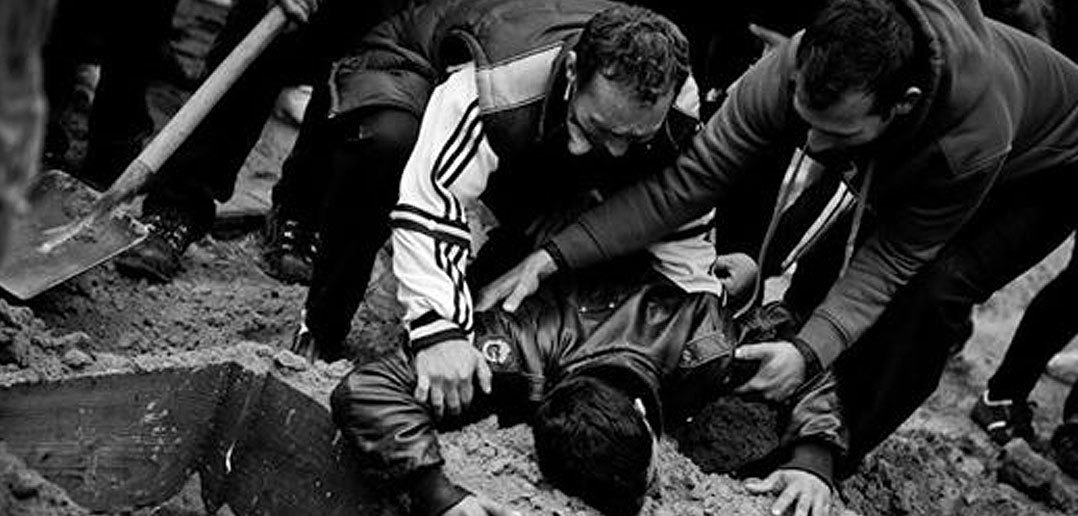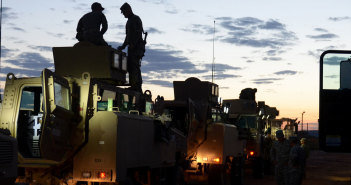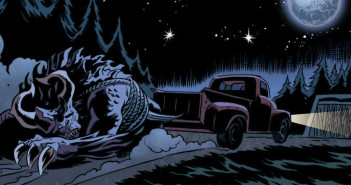It’s the little details of the Cernavoda orphanage that stand out in Ron and Josephine “Jo” Jowett’s memory: the tattered teddy-bear wallpaper, the faded Disney cartoon murals. These recollections have come to symbolize the sights they witnessed during a trip made to Romania in 1997 delivering aid—children left to suffer and die in the final stages of AIDS.
Cernavoda’s state-run orphanage stood as a monument to Romania’s communist past, and within its walls were the victims of the country’s failed regime. The Jowetts witnessed dying orphans, all under the age of 12: they were sick, underfed, and many of them disabled. The children were confined to their cots, left in their own human waste. “Once, I even saw a huge rat running around… I would not have wanted even my dog to live in there,” Jo recalls.
The orphanage’s bottom floor housed the AIDS ward. There the Jowetts discovered 24 children; their health was failing and their minds were scarred from confinement. None of the orphans had access to medication and all were malnourished. It was a sight the couple couldn’t turn away from, as they grew especially fond of one child in particular: a small 11-year-old boy named Illiaz. “In this boy, we saw a bright light; Illiaz told us how he wanted to live with a family, how he wanted a life outside the orphanage,” Ron says.
Fulfilling Illiaz’s dream would turn into the Jowetts’ life’s work.
NOT ENOUGH TIME
Long before traveling to Romania, 63-year-old Ron and 50-year-old Jo Jowett lived humble lives in Llandrindod Wells, a town in central Wales. Ron owned an auto-repair business and Jo worked as a caregiver. But despite their rural lives, the Jowetts dreamed of traveling the world, wanting nothing more than to stock up their Mercedes bus and make a pilgrimage to India. “This was a [trip]we were working towards and looked forward to making,” Jo says.
The Jowetts also enjoyed donating their time to the International Children’s Medical Aid, a British-based charity organization. For them, they collected supplies and helped raise funds. In June 1997 the Jowetts were invited to join the organization on an aid run to Romania, but it would mean diverting funds from their trip to India. It was a difficult decision, but Eastern Europe won.
After the initial visit to the Cernavoda orphanage, the Jowetts couldn’t ignore what they saw. Nor could they forget Illiaz. So they began traveling to Romania biyearly, once for a month during the summer and again for two weeks at Christmas. They’d often spend time with the children at night after the orphanage’s staff had gone home. During these night visits the Jowetts turned more and more into surrogate parents for the orphans, especially Illiaz.
But the trips forced the Jowetts’ to alter their professional lives. Ron sold his auto-repair business and instead began crafting wooden garden ornaments for sale. Jo started teaching relaxation classes from home. These shifts in professions freed the Jowetts to work around their own schedules in order to make the biannual trips to Romania possible.
They were also freed up to establish their own charity. In 1998, the International Love & Light Foundation was founded in order to help raise money and supplies for the orphanage. And most important, it helped the Jowetts continue their trips to Cernavoda for almost two years before they stopped to seriously consider how they were spending their time and resources. They both agreed that six weeks a year was simply not enough time.
“We wanted to do more for the children, [and]the only way we could make sure [they]received the benefits was if we were there,” Jo says.
“EXTENT OF THE PROBLEM”
Ron and Jo Jowett decided in 1999 that they would travel to Romania once more the following year—this time permanently. But executing the plan would be a challenge. The Jowetts wanted to initially move to Cernavoda, but after many dealings to buy property there, the prospect fell through. It wasn’t until May 1999 when a troupe of Romanian dancers appeared in Llandrindod Wells by chance for a local festival. The dancers were in a jam: they had no accommodations while in Wales. The Jowetts opened their house to them.
In return, the dancers invited them to their home of Igisu-Nou, a small village near the town of Medias, located in central Romania. The village charmed them both. “We adored the area and the simplicity of its rural life,” Jo says. There were several properties for sale, and the Jowetts found the one right for them. By December of that year, the sale was finalized. They were moving to Romania.
But the move was a great undertaking: the Jowetts sold almost all of their worldly belongings. By May 2000, they were living in a camper on their Romanian property while Ron made the house livable. Additionally, he and Jo registered a new charity as a non-governmental organization based in Romania. They decided it would be called “Love Light Romania.”
But without the Jowetts’ presence in Wales, the charity they originally founded there began to crumble, so Jo had to resuscitate it from Romania with newsletters to donors. And only weeks after moving to Igisu-Nou, they discovered a hospital in Medias that housed 10 children with HIV; an additional five were in the final stages of AIDS. Just like in Cernavoda, the place was a hovel. All of the Jowetts’ other problems became secondary.
“Through these scenes and the suffering of these children, we were seeing the extent of the problem and the lack of services for children and teenagers suffering from HIV/AIDS in [this country],” Ron says.
ROMANIA’S FORGOTTEN CHILDREN
Romania’s pediatric AIDS epidemic is the burden of Nicolae Ceausescu, the country’s communist ruler from 1965 to 1989. Just one year after rising to power, Ceausescu adopted Romanian State Decree No. 770, effectively banning abortion for all women under the age of 45. The decree was sweepingly draconian in its efforts to increase the country’s national birthrate: anyone over the age of 35, men and women alike, who didn’t have any children were severely fined.
The 1966 decree was all too effective, as an unsustainable population boom resulted. Romania’s impoverished parents abandoned many children, leaving them either to the state or to die. Orphanages quickly swelled and food shortages left nourishment for the country’s forgotten children scarce. In an attempt to counteract this, a practice of using blood transfusions in place of a proper diet was employed. But the blood wasn’t screened and only a single syringe was used to make the transfusions. Because blood was given primarily to infants, a single pint was splint among several orphans. And as the 1980s approached and AIDS was introduced to the world, Romania’s orphan population was fated to suffer.
The Romanian state under Ceausescu refused to acknowledge the rise of AIDS, and so it spread. Ceausescu’s regime collapsed shortly after in 1989, but the damage was done. The New York Times reported on the rise of pediatric AIDS in the country as early as June 1989, and in 2002, Karen Dente and Jamie Hess reported for Medscape General Medicine that by the year 2000, 60 percent of pediatric HIV/AIDS in Europe was in Romania; nearly all of them orphans.
The end of communism awoke Romania to the reality of AIDS. First, disposable syringes were distributed. Then, the government vowed to provide medical treatment to those suffering from the HIV virus and AIDS. But the promises of politics and the enactment of policy didn’t correlate, and access to vital drugs soon turned limited. In addition, old prejudices survived, causing many health workers in Romania to fear even touching an infected child, let alone care for them. The country’s efforts to remedy the past are still tenuous.
ADOPTIVE FAMILY
Biologically, Jo Jowett has two children: a 19-year-old daughter and a 28-year-old son. Ron has one daughter, age 41. But for the Jowetts, it feels like a lot more. Their move to Romania has created an adoptive family filled with more children than they ever dreamed of—it’s something they wouldn’t trade away for anything.
The center of the Love Light Romania family is the Sanctuary, a 19-room house that can accommodate a maximum of 12 permanent residents (their ages range from two to 22 years); nine are currently sheltered by the mission. Building for the house began in 2003, and it’s been growing ever since. It’s divided into private bedrooms, a lounge for the teens and young adults, a nursery for infants and younger children, and a communal dining room where everyone shares their meals. “It’s the heart of the mission,” Jo says.
Outside the Sanctuary is the Lodge, a self-contained apartment unit for guests. It stands on the same property of Ron and Jo’s house that was purchased in 1999. There’s also a third property that Love Light Romania acquired: it was intended to be the Independent Living Program for some of the older children at the mission, but due to inadequate funding, the project now stands abandoned. One of the permanent staff members currently lives on the property, and in the near future the Jowetts are going to expand it for all of the HIV-negative children sheltered by the mission.
The children’s health is a top priority. Everyone, staff and residents alike, takes twice-daily doses of multivitamins and Vitamin C. Annual flu shots are mandatory and there are strict in-house sanitation guidelines to protect health and safety. Anyone feeling ill is asked to stay away from the children, and if any child becomes sick, they are tightly monitored or hospitalized. Everyone receives first aid and HIV/AIDS awareness training and the staff receives regular physical exams and testing. A permanent staff of six caregivers, one psychologist, and one social worker keep the mission running alongside the Jowetts. And in 2002, Jo’s son, Robert Rowe, joined Love Light Romania and now sits on the Board of Directors. “He’s an unsung hero,” Jo says.
But health precautions can’t always protect the children from their untimely fates. In a way, everyone at the mission is conditioned to the outcome of AIDS and understands how to cope with it. When someone has entered the final stages, everyone pulls together. This happened in 2009 when 21-year-old Lucian, who lived at the mission for six years, died. During the last days of his life he was surrounded by his adoptive family, and his death was difficult for everyone. “I often say at such times you can hear a whisper: ‘Who is going to be next?’” Jo says.
“BRIGHT LIGHT”
The Jowetts returned to the Cernavoda orphanage and walked its empty halls in 2009. It was ghostly—the building was haunted by memories. The journey immediately called up the image of Illiaz, who never made it to the Sanctuary. “[He] was too weak to travel to our new home and passed at the end of July 2000,” Ron says. All of the memories stung, but it was a necessary catharsis.
Illiaz was once the Jowetts’ “bright light,” and now they are surrounded by children inside and outside the Sanctuary who share in that same brilliance. The sadness of the mission is inherent, but so is all of the happiness. The Jowetts reflect on Persida and Cristi, a small girl and boy who were left at the Sanctuary in 2007 by their dying mother who succumbed to AIDS in August of that year. The children once grew up in squalor, but have since flourished while living with Love Light Romania. “It’s so nice to see them so happy and full of life, and I know [their mother]would be really proud of them, seeing them having so much fun and being in school. It’s just what she wanted,” Jo says.
Since the discovery of the Cernavoda orphanage in 1997, Love Light Romania has grown into something the Jowetts never imagined. And they want the growing to continue. They hope to create outreach programs that extend further into Romania, and they want to eventually tackle the country’s extreme poverty. This will happen through a strong foundation of ever-growing donors from the West. It will also happen by empowering everyone around them: it’s imperative that the children have a guarantee that they can make the best of themselves despite the HIV virus.
“We see living proof every day that dedication and love are the answers to solving these problems,” Jo finishes.
This article originally appeared in A&U magazine. To view the PDF version of the piece’s original publication, please click here.




